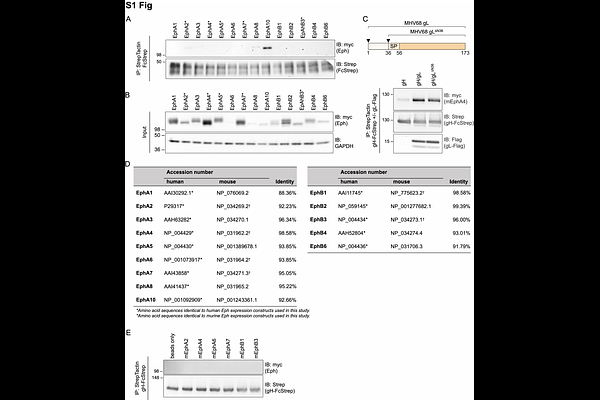Eph Receptor Tyrosine Kinases Are Functional Entry Receptors for Murine Gammaherpesvirus 68

Eph Receptor Tyrosine Kinases Are Functional Entry Receptors for Murine Gammaherpesvirus 68
Grosskopf, A. K.; Tobiasson, V.; Krug, L. T.
AbstractInteractions between viral glycoproteins and cellular receptors determine virus tropism and represent promising targets for vaccines. Eph receptor tyrosine kinases are conserved receptors for the human oncogenic gammaherpesviruses, Kaposi sarcoma herpesvirus (KSHV) and Epstein-Barr virus (EBV), and mediate entry into target cells by interaction of the viral gH/gL glycoprotein complex. To evaluate the use of murine gammaherpesvirus 68 (MHV68), a natural pathogen of rodents, as an in vivo model system for early events in gammaherpesvirus infection, we characterized the interaction of the MHV68 gH/gL complex with Eph receptors. We demonstrate a direct interaction of MHV68 gH/gL with EphA4 and EphB3, that is conserved between human and murine receptors. Pre-incubation of MHV68 inocula with soluble decoy receptors decreased infection of permissive fibroblasts. Ectopic expression of EphA4 and EphB3 enabled MHV68 to infect otherwise non-permissive human B cells, demonstrating EphA4 and EphB3 receptor function. Targeted mutations informed by protein structure predictions demonstrate that the MHV68 gH/gL-Eph interaction is determined by domain I (D-I) and follows structural motifs previously described in the KSHV gH/gL-EphA2 complex. The importance of gH D-I is further highlighted by the analysis of gH-targeting neutralizing antibodies. Antibody adsorption via the full gH ectodomain or gH D-I led to comparable reductions in neutralization capacity of serum from WT infected mice, indicating the Eph-binding domain is a major target for gH/gL-directed neutralizing antibodies. Our study characterizes Eph receptors as novel interaction partners and entry receptors for MHV68. Conservation of entry mechanisms provides the basis for future in vivo analyses of the contribution of Eph receptors to cell-type dependent MHV68 infection, as well as targeted strategies to prevent transmission and diseases associated with chronic infection.